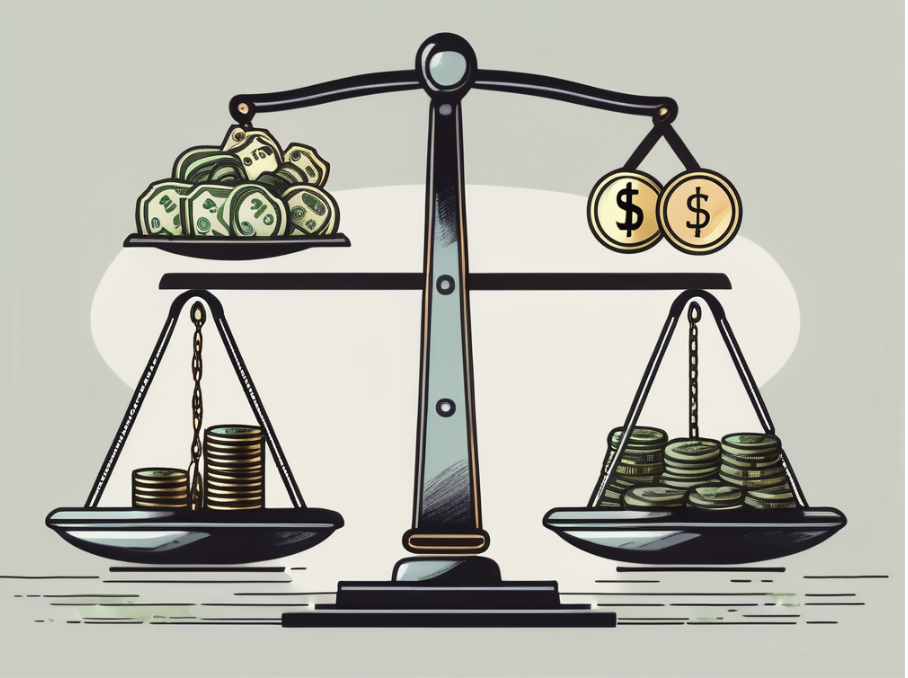7 KEY Responsibilities of a Financial Controller!
Discover the crucial role of a controller as the financial steward of an organization.

The role of a controller is indispensable in any organization’s financial management. They protect the company’s finances and manage different tasks that help with its overall financial health. In this article, we will delve into the ten key responsibilities of a controller, highlighting their significance in serving as your financial steward.
The Role of a Controller in Financial Stewardship
As a financial steward, the controller plays a crucial role in managing and safeguarding the company’s financial resources. They are responsible for implementing effective financial strategies and ensuring compliance with financial regulations. Moreover, they provide accurate financial information to support decision-making processes and enhance the organization’s financial performance.
One of the primary responsibilities of a controller is to develop and implement financial policies and procedures. They work closely with the executive team to establish guidelines for budgeting, forecasting, and financial reporting. By creating a framework for financial management, the controller helps the organization achieve its financial goals and objectives.
In addition to policy development, controllers also oversee financial operations and transactions. They watch money, handle bills and payments, and make sure financial records are correct and current. By maintaining a strong financial infrastructure, controllers help the organization operate smoothly and efficiently.
Controllers also play a key role in financial analysis and reporting. They analyze financial data, identify trends and patterns, and provide insights to management. By interpreting financial information, controllers help decision-makers understand the financial health of the organization and make informed choices.
Furthermore, controllers are responsible for ensuring compliance with financial regulations and standards. They stay updated on changes in accounting principles and regulations, and ensure that the organization follows best practices. By adhering to financial regulations, controllers protect the organization from legal and financial risks.
Controllers also help other departments in the organization with financial guidance and support. They collaborate with department heads to develop budgets, track expenses, and evaluate financial performance. By working closely with other teams, controllers help drive financial accountability and transparency throughout the organization.

Controllers are responsible for managing the financial reporting process. They prepare financial statements, including balance sheets, income statements, and cash flow statements. Controllers ensure that these reports are accurate, timely, and in compliance with regulatory requirements.

1. Understanding the Controller’s Financial Management Responsibilities
A controller’s financial management responsibilities span various aspects, including financial planning, budgeting, and forecasting. They analyze financial data, identify trends, and provide insights to support strategic initiatives. Furthermore, the controller evaluates investment opportunities and helps optimize the company’s financial resources.
Financial planning is a critical aspect of a controller’s role. They work closely with other departments to develop a comprehensive financial plan that aligns with the company’s goals and objectives. This involves assessing the current financial position, identifying potential risks and opportunities, and creating strategies to achieve financial targets.
One of the key responsibilities of a controller is budgeting. They collaborate with department heads to develop and monitor budgets, ensuring that expenditures are in line with the approved budget. This involves analyzing historical data, market trends, and future projections to determine realistic budget allocations for each department.
In addition to financial planning and budgeting, controllers also play a vital role in forecasting. They utilize various financial models and tools to predict future financial outcomes based on historical data and market trends. These forecasts help the company make informed decisions and adapt to changing market conditions.
Controllers are not only responsible for analyzing financial data but also for providing insights and recommendations to support strategic initiatives. They work closely with senior management to identify areas for improvement, cost-saving opportunities, and revenue-generating strategies. By analyzing financial trends and performance metrics, controllers provide valuable insights that drive informed decision-making.
Furthermore, controllers evaluate investment opportunities to ensure the company’s financial resources are optimized. They analyze finances and risks to decide if different projects are possible and will make money. This involves analyzing cash flows, conducting market research, and evaluating potential risks and rewards.
2. Establishing and Maintaining Financial Controls
One of the vital responsibilities of a controller is to establish and maintain robust financial controls. They implement internal control procedures to prevent fraud, ensure the accuracy of financial records, and safeguard the company’s assets. By monitoring and improving financial processes, the controller minimizes financial risks and fosters a secure financial environment.
The controller is important for creating and enforcing rules that control the company’s financial activities. This includes developing guidelines for financial reporting, expense management, and cash handling. By setting clear expectations and standards, the controller ensures that all financial transactions are conducted in a consistent and transparent manner.
Furthermore, the controller is responsible for regularly reviewing and updating financial controls to adapt to changing business needs and regulatory requirements. This involves staying up-to-date with industry best practices and emerging trends in financial management. The controller improves financial controls to prevent risks and ensure compliance with laws and regulations.
In addition to preventing fraud and ensuring accuracy, financial controls also play a critical role in safeguarding the company’s assets. The controller ensures that the company’s money is safe by using measures like separating tasks, controlling access, and securing the premises. By implementing these controls, the controller minimizes the risk of misappropriation or misuse of assets, ensuring that the company’s resources are utilized effectively and efficiently.
Another aspect of maintaining financial controls is the controller’s role in monitoring and analyzing financial processes. They regularly review financial reports and statements to identify any anomalies or irregularities that may indicate potential risks or errors. By conducting thorough analyses, the controller can detect and address any issues promptly, ensuring the accuracy and integrity of financial data.
Moreover, the controller collaborates with other departments and stakeholders to ensure that financial controls are effectively communicated and understood throughout the organization. This includes providing training and guidance on financial policies and procedures, as well as promoting a culture of compliance and accountability. By fostering a shared understanding of financial controls, the controller helps create a cohesive and responsible financial environment.
3. Duties of a Controller in Financial Reporting
The controller plays a pivotal role in financial reporting, ensuring the accurate and timely preparation of financial statements. They adhere to accounting standards and regulations while presenting the financial position and performance of the organization. By providing transparent and reliable financial information, the controller enhances stakeholders’ confidence in the company.
One of the key responsibilities of a controller in financial reporting is to oversee the preparation of financial statements. This involves gathering and analyzing financial data from various sources within the organization, such as the general ledger, accounts payable, and accounts receivable. The controller then ensures that this data is accurately recorded and classified in accordance with the relevant accounting standards.
In addition to preparing financial statements, the controller also plays a crucial role in ensuring the accuracy of the financial information presented. They review the financial data for errors or inconsistencies, conducting thorough analyses and reconciliations to identify and resolve discrepancies. Being meticulous is important for keeping financial statements accurate and giving stakeholders trustworthy information.
Furthermore, the controller is responsible for staying up-to-date with the latest accounting standards and regulations. They must have a deep understanding of the Generally Accepted Accounting Principles (GAAP) or International Financial Reporting Standards (IFRS), depending on the jurisdiction in which the organization operates. This knowledge helps the controller follow rules and regulations, giving stakeholders accurate financial statements that meet industry standards.
Another important duty of the controller is to communicate financial information effectively to stakeholders. This involves preparing comprehensive financial reports and presentations that clearly explain the organization’s financial performance, trends, and forecasts. The controller must possess strong communication skills to effectively convey complex financial concepts to financial and non-financial stakeholders, ensuring that they clearly understand the financial position and performance of the company.
Moreover, the controller plays a vital role in managing the internal controls and processes related to financial reporting. They establish and enforce policies and procedures to safeguard the organization’s assets and ensure the accuracy and reliability of the financial data. This includes implementing segregation of duties, conducting regular internal audits, and monitoring the effectiveness of the internal control systems.
Lastly, the controller also collaborates with external auditors during the audit process. The controller uses financial reports to help management make smart decisions and take actions for the organization’s success. The controller is a liaison between the organization and the auditors, ensuring a smooth and efficient audit process.
4. A Controller’s Budgetary Oversight Responsibilities
Budgetary oversight, a pivotal facet of financial stewardship, constitutes the meticulous management of financial resources within an organization. The controller, acting as the linchpin in this crucial process, engages in collaborative efforts with department heads to meticulously develop budgets reflective of organizational needs and objectives.

Beyond the initial budgetary formulation, the controller assumes a central role in continuous monitoring of spending patterns, employing astute financial acumen to analyze budget variances and deviations from projections.
Moreover, the controller’s involvement in accounting functions extends to implementing strategic measures aimed at controlling costs. Through comprehensive financial analysis, they identify opportunities for cost optimization, ensuring the judicious allocation of resources. This strategic approach not only fortifies fiscal discipline but also enhances the overall efficiency of resource utilization within the organizational framework.
In addition to the day-to-day oversight, the controller serves as a key liaison between the accounting functions and the executive leadership, including the Chief Financial Officer (CFO). This collaborative dynamic ensures seamless communication and alignment of financial activities with the broader strategic goals of the organization. The controller’s reporting structures and financial insights contribute significantly to the CFO’s decision-making processes, providing them with valuable data to make informed choices that align with the overarching financial strategy.
In essence, the Controller’s multifaceted role in budgetary oversight and collaboration with the Chief Financial Officer (CFO) underscores their indispensability in maintaining financial health, fostering efficiency, and contributing to the realization of organizational objectives.
5. The Controller’s Role in Risk Management
A seasoned professional with extensive years of experience in financial management, the controller assumes a pivotal role in proactively addressing and mitigating risks within an organization. Drawing upon their wealth of expertise, gained over years of navigating diverse financial landscapes, they bring a nuanced understanding to the identification of potential risks. This wealth of experience positions the controller as a strategic guardian, adept at foreseeing challenges that may arise, and implementing effective risk mitigation strategies.
Furthermore, the controller’s commitment to ensuring a robust risk management framework is exemplified through their academic qualifications. Armed with a degree in accounting, they combine theoretical knowledge with practical acumen to assess both internal and external threats comprehensively. The educational foundation in accounting equips the controller with the analytical skills necessary to develop meticulous risk management policies tailored to the specific needs of the organization.
In addition to policy development, the controller diligently monitors compliance with established risk management protocols. Their role extends beyond mere identification and mitigation; it involves ongoing vigilance to ensure that the organization adheres to the prescribed risk management strategies. This proactive approach not only safeguards the company’s financial stability but also positions it to navigate unforeseen challenges with resilience.
6. Analyzing Financial Records and Reporting Results
Accurate and timely financial analysis is another crucial responsibility of a controller. They analyze financial records, identify trends, and provide valuable insights into the company’s financial performance. Through comprehensive financial reports, the controller enables management to make informed decisions and take necessary actions to drive the organization’s success.

7. The Controller’s Role in Cash Flow Management
Managing cash flow is crucial for financial stability, and the controller plays a key role in this. They monitor cash inflows and outflows, forecast cash flow projections, and develop strategies to optimize liquidity. By ensuring a healthy cash flow position, the controller contributes to the organization’s financial resilience.
The Advantages of Having a Controller as Your Financial Steward
Having a controller as your financial steward offers numerous advantages. They provide financial expertise and insights, guide strategic decision-making, and ensure effective financial management. With their help, organizations can navigate volatile financial landscapes, capitalize on opportunities, and achieve sustainable growth.

IN CONCLUSION
The role of a controller in financial stewardship is multifaceted and critical to the success of an organization. Controllers manage and protect a company’s money by creating policies, overseeing operations, and giving financial advice. Their expertise and attention to detail ensure that the organization operates efficiently, complies with financial regulations, and makes informed decisions to enhance its financial performance. From managing financial controls to providing accurate financial reports, a controller’s expertise is indispensable in today’s complex business environment. By fulfilling these ten key responsibilities, controllers play a vital role in shaping the organization’s financial future.
It All Starts With a FREE consultation!
Every client’s needs are unique and require varying amounts of time and attention. You can use this form to let us know what you’re looking for, and we’ll reach out to you to schedule an appointment and talk about rates for your business needs.
Please be as detailed as possible with what work is needed, what industry your business is in, and where you are located.
Our team will contact you with in 2 business days to set up the first meeting. We will make sure all your needs are taken into account when selecting the package and type of services you need.






Stay In Touch